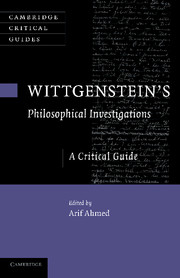Book contents
- Frontmatter
- Contents
- List of contributors
- Acknowledgments
- Introduction
- 1 From referentialism to human action: the Augustinian theory of language
- 2 What's doing? Activity, naming and Wittgenstein's response to Augustine
- 3 Measure for measure? Wittgenstein on language-game criteria and the Paris standard metre bar
- 4 Wittgenstein on family resemblance concepts
- 5 Wittgenstein on concepts
- 6 Wittgenstein vs contextualism
- 7 Wittgenstein and the linguistic turn
- 8 Rorty's Wittgenstein
- 9 Are meaning, understanding, etc. definite states?
- 10 Another strand in the private language argument
- 11 Deductive inference and aspect perception
- 12 Remembering intentions
- Bibliography
- Index
7 - Wittgenstein and the linguistic turn
Published online by Cambridge University Press: 06 July 2010
- Frontmatter
- Contents
- List of contributors
- Acknowledgments
- Introduction
- 1 From referentialism to human action: the Augustinian theory of language
- 2 What's doing? Activity, naming and Wittgenstein's response to Augustine
- 3 Measure for measure? Wittgenstein on language-game criteria and the Paris standard metre bar
- 4 Wittgenstein on family resemblance concepts
- 5 Wittgenstein on concepts
- 6 Wittgenstein vs contextualism
- 7 Wittgenstein and the linguistic turn
- 8 Rorty's Wittgenstein
- 9 Are meaning, understanding, etc. definite states?
- 10 Another strand in the private language argument
- 11 Deductive inference and aspect perception
- 12 Remembering intentions
- Bibliography
- Index
Summary
There are profound differences of opinion among contemporary philosophers both about whether Wittgenstein is worth reading and about what one can learn from him. They parallel disagreements about whether, and in what sense, philosophical problems are problems of language. In this paper, I shall describe three views of Wittgenstein, corresponding to three ways of thinking about the so-called ‘linguistic turn in philosophy’. Doing so will help me defend two claims for which I have argued in the past. First: there is no interesting sense in which philosophical problems are problems of language. Second: the linguistic turn was useful nevertheless, for it turned philosophers' attention from the topic of experience towards that of linguistic behavior. That shift helped break the hold of empiricism – and, more broadly, of representationalism.
Contemporary philosophers who call themselves ‘naturalists’ typically see little value in Wittgenstein's work. For them, the central topic of philosophy is what Phillip Pettit calls, in Sellarsian language, the clash between ‘the manifest image’ and ‘the scientific image’. The manifest image incorporates what Pettit calls ‘the ideas that come with our spontaneous, everyday practices, such as the ideas we naturally have about freedom and consciousness, causation and law, value and duty’. The scientific image, he says, ‘challenges us to look for where in that world there can be room for phenomena that remain as vivid as ever in the manifest image: consciousness, freedom, responsibility, goodness, virtue and the like’.
Keywords
- Type
- Chapter
- Information
- Wittgenstein's Philosophical InvestigationsA Critical Guide, pp. 129 - 144Publisher: Cambridge University PressPrint publication year: 2010
- 5
- Cited by

